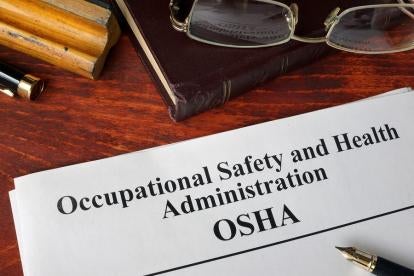The U.S. Department of Labor issued on Nov. 4 the long-awaited emergency rule implementing President Biden’s mandate that employers of 100 or more employees company-wide (at any time the emergency rule is in effect) require their workforce to be vaccinated. The Emergency Temporary Standard (ETS) is effective on Friday, Nov. 5, when the Occupational Safety and Health Administration (OSHA) is scheduled to publish the interim rule in the Federal Register. The OSHA ETS will also apply to teachers, school staff and state and local government workers in twenty-six states.
OSHA puts the onus on employers to ensure their workforce is fully vaccinated, or undergo weekly testing, to curb the spread of COVID-19 through minimum requirements intended to preempt inconsistent state and local requirements. Employers must either establish, implement, and enforce a written policy (1) mandating vaccination or (2) allowing employees the choice to be vaccinated or provide proof of weekly COVID-19 testing.
Regardless of which policy is implemented, employers must determine the vaccination status of their employees. Vaccinated employees must provide acceptable proof of vaccination, documentation of which employers must maintain. Employers also must create a roster identifying each employee’s vaccination status. OHSA’s ETS identifies the specific documents constituting acceptable proof of vaccination status. Employers are encouraged to consult with their labor and employment counsel to ensure they are collecting and maintaining the appropriate documentation consistent with applicable workplace privacy law.
Employers also must provide up to four hours of paid time off for employees to get vaccinated and paid sick leave to employees to recover from vaccine side effects. Employees who are not fully vaccinated must be tested at least once every seven days and must provide documentation of their most recent test result to their employer no later than the seventh day. Under the ETS, employers need not pay for COVID-19 testing. However, there are possible implications under state wage and hour laws that should not be ignored.
Testing documentation must be maintained by the employer and treated as a medical record — meaning the test results must be kept separate from the employee’s personnel file. Besides weekly testing, unvaccinated employees must wear face coverings when in the workplace unless eating and drinking or alone in an enclosed room with a closed door. The ETS requires that any non-compliant employee be removed from the workplace.
An employee who tests positive for COVID-19 or is diagnosed with COVID-19 by a licensed healthcare provider must remain out of the workplace until either the employee: (1) receives a negative result on a COVID-19 nucleic acid amplification test, (2) meets the return to work criteria in the CDC’s “Isolation Guidance”, or (3) receives a recommendation to return to work from a licensed healthcare provider. If an employee tests positive for or is diagnosed with COVID-19, following the employee’s return to work, the employer need not require another test for 90 days following the positive test or diagnosis. Although paid time off for COVID-19 is not required, the ETS does not affect potential policies or obligations for paid leave under other laws, regulations, collective bargaining agreements or other agreements negotiated with organized labor.
The ETS further requires employers to educate employees regarding the mandates of the ETS, the efficacy of the COVID-19 vaccine, the laws preventing retaliation for reporting workplace injuries, and the criminal penalties for knowingly providing false statements or documentation. Employers also have reporting obligations to OSHA if they learn of COVID-19 related fatalities or in-patient hospitalizations.
The ETS is not intended to interfere with collective bargaining agreements and does not abrogate employees’ rights under the Americans with Disabilities Act, as amended, and Title VII of the Civil Rights Act of 1964 to request a reasonable accommodation respectively due to a disability or a sincerely held religious belief. Further, employees for whom the vaccine is medically contraindicated or for whom medical necessity requires a delay are exempt from the ETS. Whether an accommodation request, or exemption, should be granted is a highly fact specific determination best handled in consultation with a labor and employment attorney.
Notably, the ETS does not apply to employees who work remotely, report to a workplace where no other people are present or who work exclusively outside of the employer’s workplace. Unvaccinated employees who occasionally visit the workplace must provide proof of a negative test within seven days before entering the workplace.
The ETS is intended to establish minimum standards and does not prevent employers from implementing additional measures not addressed in the interim rule. The ETS is intended to preempt states, and political subdivisions of states, from banning or limiting an employer’s authority to require vaccination, face coverings, or COVID-19 testing, and is expected to reach two-thirds of all private sector workers in the nation.
The ETS does not apply to federal contractors and subcontractors covered under the Safer Federal Workforce Task Force COVID- 19 Workplace Safety: Guidance for Federal Contractors and Subcontractors nor certain healthcare service providers.
The compliance date for all provisions, except the requirement for COVID-19 testing for unvaccinated employees is Sunday, Dec. 5. Employers must comply with the COVID-19 testing and reporting requirements beginning Tuesday, Jan. 4. Employees also must complete their vaccine regimen by Tuesday, Jan. 4.
This client alert is not intended to address the nuances of the ETS nor all of an employer’s obligations under the ETS. Employers are encouraged to consult with their labor and employment counsel to become educated about their duties and responsibilities under the ETS. Nelson Mullins and its employment law attorneys regularly advise employers on COVID-19 matters and stand ready to assist employers interpret, implement and comply with the ETS requirements.







 i
i


